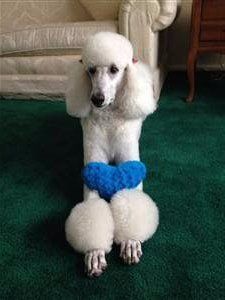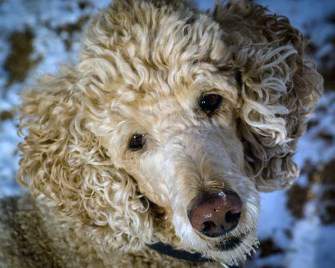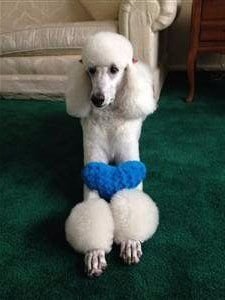When it comes to our beloved poodles, it can be quite surprising to discover that these elegant and intelligent dogs have a tendency to emit an unpleasant odor. While they may appear prim and proper with their fancy haircuts and regal demeanor, the question remains: why do poodles stink? There is actually a fascinating reason behind this, rooted in their unique coat and skin composition.
Poodles have a dense and curly coat that requires regular grooming and maintenance. This distinctive hair texture, combined with their active lifestyle, can create the perfect breeding ground for bacteria and yeast to thrive on their skin. These microorganisms produce natural oils and odors, resulting in that distinct smell often associated with poodles. Additionally, poodles are prone to allergies, which can further contribute to skin sensitivity and odor issues.
While poodles may develop an odor if not properly groomed, their unique coat actually helps to minimize unpleasant smells. Poodles have curly hair that traps dirt and debris, which can lead to a buildup of odor-causing bacteria. Regular bathing, brushing, and professional grooming can help keep poodles smelling fresh. Additionally, their diet and overall health can also influence their scent. By maintaining a clean environment and implementing a proper grooming routine, you can keep your poodle smelling great.

The Odor Mystery: Understanding Why Poodles Have a Strong Smell
One common complaint among poodle owners is the strong smell that often accompanies these beloved pets. While poodles are known for their intelligence, beauty, and hypoallergenic coats, their unique odor can be quite challenging to deal with. Understanding the reasons behind why poodles stink is crucial for pet owners who want to maintain a clean and fresh-smelling environment. In this article, we will explore the various factors that contribute to poodles’ strong smell and discuss how to address this issue effectively. Let’s dive in!
1. Natural Oils in the Poodle’s Coat
Poodles have a dense curly coat that is designed to protect them from the elements. Their fur is prone to trapping dirt, debris, and oils, which can cause a distinct odor over time. Poodles have oil-producing glands in their skin that naturally secrete oils to keep their coat moisturized. While these oils are essential for maintaining a healthy coat, they can also contribute to a pungent smell if not properly managed.
Regular grooming and bathing are vital to minimize the buildup of natural oils and prevent the development of a strong odor. This includes brushing your poodle’s coat regularly to remove loose fur and debris, as well as scheduling regular baths with a gentle, pet-friendly shampoo. Additionally, professional grooming sessions can help keep your poodle’s coat clean, healthy, and smelling fresh.
2. Ear Infections and Odor
Poodles are particularly prone to ear infections due to the structure of their ears and the hair that can grow inside them. The long, floppy ears of poodles create a warm and moisture-rich environment, perfect for the growth of bacteria and yeast. These ear infections can cause a foul smell, which can be quite unpleasant for both the poodle and its owner.
Regular ear cleaning is crucial for preventing ear infections and associated odor. Use a veterinarian-recommended ear cleaner and follow the instructions for proper usage. Gently wipe the inside of your poodle’s ears with a clean cloth or cotton pad, being careful not to insert anything into the ear canal. If you notice any signs of infection, such as redness, discharge, or odor, consult a veterinarian for appropriate treatment.
3. Dental Health and Bad Breath
Another potential source of odor in poodles is poor dental hygiene. Just like humans, poodles can experience dental issues such as plaque buildup, tartar, gum disease, and tooth decay. These dental problems can lead to bad breath, also known as halitosis, which can be quite off-putting.
Regular dental care, including brushing your poodle’s teeth with a veterinarian-approved toothpaste, is essential for preventing dental issues and controlling bad breath. Provide your poodle with dental chews or toys designed to promote oral health. Schedule regular dental check-ups with a veterinarian to ensure your poodle’s teeth and gums are in good condition.
4. Diet and Digestive Issues
The food your poodle eats plays a significant role in their overall health and, consequently, their smell. Low-quality or inappropriate dog food can lead to digestive issues, such as indigestion, gas, and diarrhea. These digestive problems can result in an unpleasant odor emanating from your poodle.
Choosing a high-quality, balanced diet that suits your poodle’s specific needs is essential for proper digestion and minimizing odor. Consult with a veterinarian to determine the best diet for your poodle, taking into consideration any specific health conditions or dietary restrictions.
Other Factors That Contribute to Poodle Odor
5. Pheromones and Hormonal Changes
Pheromones are chemical substances produced by animals that elicit specific behaviors or responses in other members of the same species. Poodles, like other dogs, naturally release pheromones, which can contribute to their unique scent. Additionally, hormonal changes, such as those that occur during adolescence or the estrous cycle in females, can affect a poodle’s odor.
While it is impossible to eliminate pheromones or hormonal changes entirely, proper grooming, regular bathing, and maintaining a clean living environment can help minimize their impact on the overall odor of your poodle.
6. Skin Infections and Allergies
Poodles can be prone to various skin infections and allergies, which can result in itching, redness, inflammation, and an unpleasant smell. Common causes of skin issues in poodles include allergies to certain foods, environmental allergens (such as pollen or dust mites), and parasites like fleas or mites.
If you notice any signs of skin infections or allergies in your poodle, such as excessive scratching, rashes, or a persistent foul odor, it is essential to seek veterinary care. Your veterinarian can determine the underlying cause of the issue and provide the appropriate treatment to alleviate the symptoms and minimize odor.
7. Anal Gland Problems
Poodles, like many other dog breeds, have anal glands located on either side of their anus. These glands secrete a scent that is unique to each individual dog and helps with marking territory. However, if the anal glands become impacted or infected, they can produce a strong and unpleasant smell.
If you notice your poodle excessively scooting their bottom on the ground, licking or biting at the anal area, or emitting a foul smell from their rear end, it may indicate a problem with the anal glands. It is crucial to have a veterinarian examine and express the anal glands if necessary to resolve any issues and eliminate the odor.
8. Environmental Factors
The environment in which your poodle lives can also contribute to their overall odor. Factors such as poor ventilation, high humidity, and the presence of mold or mildew can lead to a musty or unpleasant smell in your home and on your poodle.
Ensure that your poodle’s living space is clean, well-ventilated, and free from any potential sources of odor. Regularly clean and disinfect areas where your poodle spends time, including their bedding, toys, and crate, if applicable. Use pet-friendly cleaning products to avoid any adverse reactions or allergies.
9. Lack of Grooming and Hygiene Practices
Poor grooming and hygiene practices are significant contributors to the strong smell often associated with poodles. Neglecting regular brushing, bathing, and cleaning can allow dirt, debris, and oils to accumulate in your poodle’s coat, leading to an odor problem.
Establish a consistent grooming routine for your poodle, including regular brushing, bathing, and ear cleaning. Trim your poodle’s nails as needed and schedule professional grooming sessions to maintain a fresh and clean appearance. These practices will not only help minimize odor but also contribute to your poodle’s overall health and well-being.
10. Underlying Health Issues
Sometimes, a strong and persistent odor in poodles can be a symptom of an underlying health issue. Conditions such as urinary tract infections, liver or kidney problems, or metabolic disorders can result in unusual body odors.
If you have addressed all the possible factors contributing to your poodle’s odor, including diet, grooming, and hygiene practices, and the smell persists, it’s crucial to consult a veterinarian. They can conduct appropriate diagnostic tests and examinations to determine if there are any underlying health issues that need to be addressed.
In Conclusion
The strong smell often associated with poodles can be attributed to various factors, including natural oils in their coat, ear infections, dental health, diet, hormonal changes, skin infections or allergies, anal gland problems, environmental factors, lack of grooming and hygiene practices, and underlying health issues. By addressing and managing these factors, poodle owners can ensure that their beloved pets remain clean, healthy, and odor-free.
Key Takeaways – “Why Do Poodles Stink?”
- Poodles can develop a distinct odor due to their skin and coat characteristics.
- Poodle’s curly, dense, and hypoallergenic fur can trap bacteria and moisture, leading to a smell.
- Lack of proper grooming, including regular bathing and brushing, can contribute to poodle odor.
- Poodles may have skin issues or allergies that can cause an unpleasant smell.
- Ear infections in poodles can also be a source of stench.
Frequently Asked Questions
Poodles are known for their elegance and intelligence, but sometimes they can develop a noticeable odor. Pet owners often wonder why poodles stink and what can be done to address this issue. In this article, we will answer five frequently asked questions about why poodles may have a distinct smell and provide tips for keeping them fresh and clean.
1. How can I prevent my poodle from developing a bad odor?
Poor hygiene and improper grooming are common culprits of bad odor in poodles. Ensure that you bathe your poodle regularly using a gentle, dog-specific shampoo. Regular brushing is also essential to remove dirt, dead hair, and skin flakes. Additionally, remember to clean your poodle’s ears and teeth regularly to prevent odor-causing bacteria from thriving.
Another important aspect is nutrition. A balanced and healthy diet can contribute to your poodle’s overall well-being and minimize the likelihood of developing a strong odor. Consult with your veterinarian for dietary recommendations specific to your poodle’s needs.
2. Could a poodle’s stench be a sign of an underlying health issue?
In some cases, a persistent foul odor could indicate an underlying health issue. Poodles are prone to certain skin conditions, such as yeast infections or allergies, which can lead to an unpleasant smell. If you notice an ongoing odor that does not improve with regular grooming, it is advisable to consult your veterinarian. They can examine your poodle and determine if any underlying health issues need to be addressed.
Additionally, certain medical conditions or a poodle’s anal glands could be the source of the smell. A thorough examination by a professional will help identify the cause and provide appropriate treatment.
3. Are there any specific grooming techniques to keep a poodle smelling fresh?
Poodles have a unique coat that requires regular grooming to maintain a fresh smell. Regular brushing helps to remove dirt, debris, and odor-causing substances present in their hair. Consider scheduling professional grooming appointments every four to six weeks to ensure their coat is properly maintained.
Additionally, keeping your poodle’s ears and teeth clean is important to prevent odor buildup. Use a dog-safe ear cleanser and follow proper procedures when cleaning their ears. Brush your poodle’s teeth regularly using dog-specific toothpaste and a toothbrush designed for dogs.
4. Can environmental factors contribute to a poodle’s odor?
Absolutely. Environmental factors can play a role in a poodle’s smell. Poodles are active dogs, and their playtime can lead to sweating, which can cause a mild odor. It is essential to provide your poodle with a comfortable living environment, with access to fresh air and proper ventilation.
If your poodle spends a lot of time outdoors, ensure they have a clean and dry space to rest to prevent any lingering odors. Regularly clean their bedding and sanitize their toys to maintain a clean and fresh environment.
5. What are some tips for tackling specific poodle smells?
Poodles can develop specific odors, such as a “wet dog” smell or a strong odor from their coat. To tackle a “wet dog” smell, ensure your poodle is thoroughly dried after being exposed to water. Use a towel to gently dry their fur, and consider using a blow dryer on a low heat setting to prevent any lingering dampness.
If your poodle has a strong odor from their coat, try using a dog-specific deodorizing spray or wipe to freshen them up. These products are designed to neutralize odors and leave a pleasant scent without irritating your poodle’s skin. Remember to choose products specifically formulated for dogs and follow the instructions provided.

Why do Poodles Stink?
Poodles can have a distinct odor due to various factors that are common among dogs. These include sweat glands, natural oils on their skin, and the presence of bacteria on their fur. In addition, poodles have curly or wavy hair that can trap dirt, debris, and moisture, leading to a stronger smell.
To prevent poodle odor, regular grooming is essential. This includes bathing them with dog-specific shampoos, brushing their coat to remove dirt and tangles, and keeping their ears clean to prevent infections. It’s also important to maintain a healthy diet and provide regular exercise to ensure overall well-being. By following these practices, poodle owners can manage their pet’s odor and enjoy a fresh-smelling companion.
